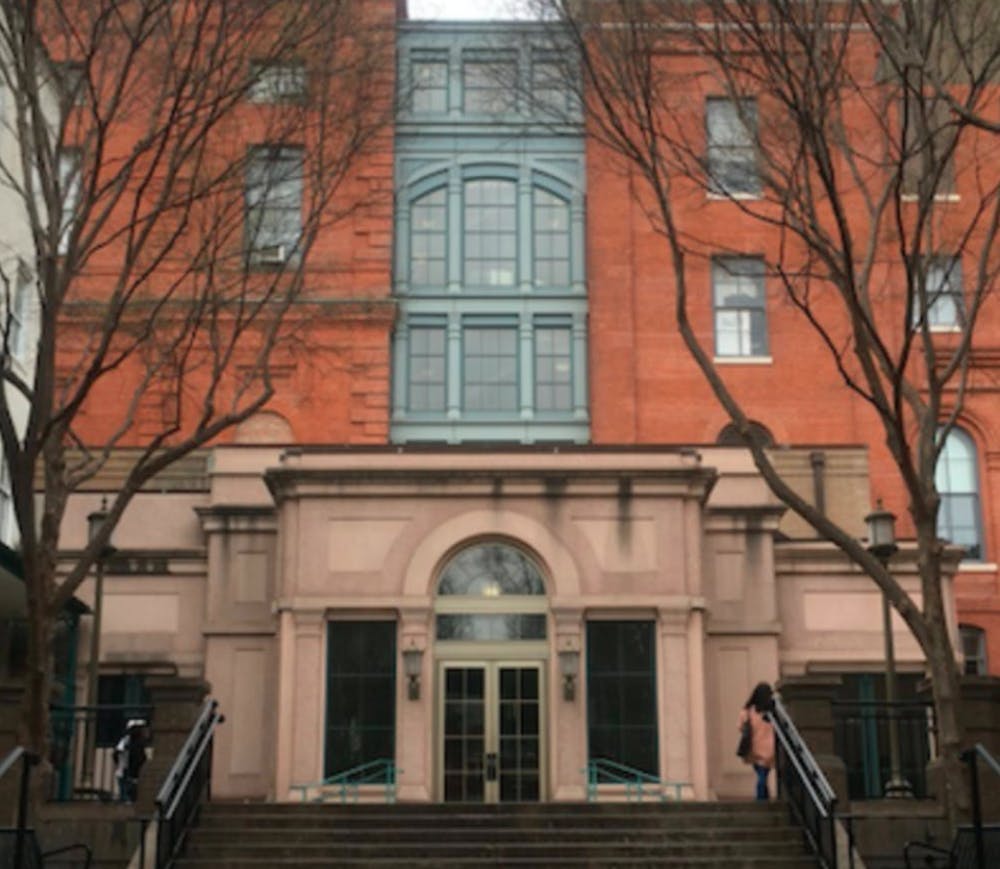Antisemitic graffiti was found etched into the walls of a dormitory elevator at the Peabody Institute, according to an email sent on Jan. 26 by University President Ronald J. Daniels and Provost Sunil Kumar.
The graffiti, which has since been covered up, was of four swastikas, an emblem of the Nazi Party that continues to be used today by white supremacists.
“Johns Hopkins University unequivocally condemns the use of this symbol of hate and the antisemitism it embodies in all its forms,” Daniels and Kumar wrote. “We take seriously this and every incident that glorifies hate and violence, and we will continue to investigate and to take all appropriate action to protect the safety and well-being of all members of our community.”
Prior to the email, student groups including Jewish fraternity Alpha Epsilon Pi (AEPi) and the Jewish Student Association of Peabody (JSAP) posted statements on Instagram about the incident, which occurred on Jan. 25 and has since been officially labeled as a hate crime.
AEPi Sentinel and sophomore Nathan Felmus spoke to the graffiti’s hatefulness in an interview with The News-Letter.
“When something like this happens, I think about my family and my friends who are Jewish, but it affects everyone, not just Jews,” he said. “It’s sad when there is a symbol of hate that is so universal that when it is discovered you have to think, ‘Which person is this meant to target?’”
In an email to The News-Letter, JSAP Vice President and Peabody junior Philip Barsky voiced his appreciation for the University’s response to the hate crime.
He also emphasized that the graffiti makes him feel threatened.
“This shocking incident does make me slightly unsafe on campus and like I should be looking over my shoulder, at least while I’m at Peabody,” he wrote. “Before this incident I didn’t believe [antisemitism] was an issue at all. I felt, and still feel, very in touch with the Jewish community here at Hopkins through Hillel and do not feel much pushback from any of my peers.”
Felmus shared that expressions of hate have been so prevalent in his life that they no longer shock him. He is, however, still disturbed when they occur.
“It is unequivocally disgusting, hateful and malicious,” he said. “That somebody would carve it somewhere that so many people will walk past everyday, basically saying you are not welcome here, makes me sad.”
AEPi President and Peabody sophomore Eli Wasserman noted that the vandalized elevator was located in his first-year building.
“You see articles about antisemitic attacks at college campuses, but like many other shocking events, you never expect them to happen right at home, especially at your dorm,” he said.
In their email, Daniels and Kumar mentioned that antisemitic hate crimes are at an all-time high nationwide.
They stated that they alerted Campus Safety and Security of the incident and also launched an investigation through the Office of Institutional Equity.
Executive Director of Hillel Noam Bentov commended the University’s response in an interview with The News-Letter, highlighting the involvement of federal law enforcement.
Felmus sees the incident, which occurred just days before International Holocaust Remembrance Day on Jan. 27, as an opportunity to further educate the Hopkins community about the history of antisemitism.
“The state of Holocaust education in this country is just horrible. There are statistics that come out every year about how little accurate information is being taught about the Holocaust,” he said. “I think it is the responsibility of organizations like [AEPi] to connect people to resources and give not just Jewish students but all students who were disturbed or confused by this some way to deal with that.”
During the Holocaust era, the Nazis murdered six million Jews as well as millions of other groups, including Poles, gay men and people with disabilities, as well as religious and political dissidents.
Wasserman, whose grandfather survived the Holocaust, believes that education through exposure to Holocaust survivors and their relatives will be most effective in making people recognize the hate that the swastika symbolizes.
“Hearing personal stories, you realize the meaning and the weight behind this terrible symbol,” he said. “You see that it’s real people’s lives and stories that have been torn up because of this symbol, and now it’s just being etched on an elevator without a second thought.”
Daniels and Kumar urged students in need of support to use the resources offered through mySupport and Student Wellness. They also encouraged students to take any safety concerns to Campus Security.
Peabody administrators are also holding a town hall from 6 p.m. to 7 p.m. on Jan. 28 to hear student concerns.
Claire Goudreau contributed reporting to this article.





